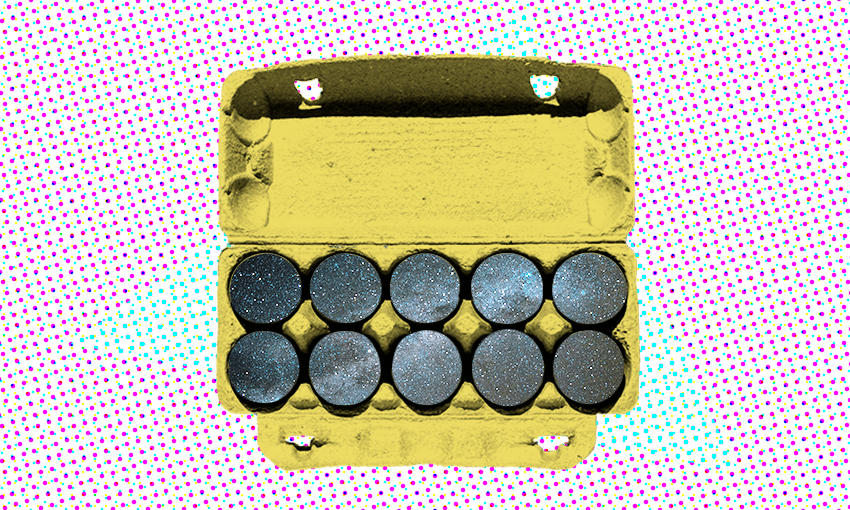Over-egging the pav has become harder in recent months, with egg shortages taking hold across Aotearoa. Here’s what you need to know.
What’s the situation?
Up and down the motu, supermarket egg shelves are empty, mostly empty, or asking shoppers to please only take two. End-of-driveway-honesty-box egg businesses are booming. Trade Me searches for chickens are off the charts. Bakeries are bricking it.
Is there a bird flu?
Not here. Although an avian flu, plus the Ukraine conflict driving up the price of grain-based chicken feed, is causing European shortages. Our egg supply has dwindled on the back of legislation that came into effect at the end of last year.
Back in 2012, the government committed to banning battery cages which don’t allow hens to move around, roost or do any normal chicken stuff except lay. Animal welfare advocates wanted an immediate ban. Others felt this would cause an unacceptable supply drop and price surge: more than 80% of New Zealand eggs were laid in battery cages at the time. The government passed legislation to enact a 10-year phased roll-out culminating in an outright battery ban.
Fast forward 10 years, where are we now?
While most people forgot all about this legislation, farmers got to work converting battery cages to colony cages or free-range setups. Then the ban came into effect at the end of last year and eggs disappeared from shelves during peak baking season. To meet demand, New Zealand needs 2.8-2.9 million laying hens. There are now only 2.5.
They had a decade… did farmers drag their feet?
Egg farmers have faced blame for this shortage. But they’ve had significant roadblocks too. Many farmers struggled to get resource consent to change their systems. Lengthy wait times, three and half years in one case, slowed change.
The real kicker, though, was a 2017 announcement from the supermarket duopoly that they would only buy free-range or barn-raised eggs from 2025 (Woolworths) and 2027 (Foodstuffs). By the time of the announcement, 33% of battery cages had already been converted to colony cages which were allowed under the new legislation. The supo decision rendered these upgrades useless. One farm had already spent $60m converting to colony cages. Farmers were out of pocket, scrambling to buy more land for free range. Others left the industry altogether.
So is it cage-free or bust?
Pretty much. And for a lot of farmers it’s looking like bust. Free range requires a lot more space, and even barn-raised produces fewer eggs per metre than colony or battery cages. More space for chickens means farmers need more expensive agricultural land which is increasingly being snapped up and built over by housing developers. Developers are a group few would be keen to compete with.
What’s behind the supermarkets’ decision?
Animal welfare! Conscious consumption! Giving the consumer what they want! Or is it… a play to remove less premium, lower margin products from shelves? Supermarket behaviour up to now points to the latter.
In the end, the supermarkets’ suspiciously bi-lateral decision seems to have had more of an impact on the egg industry than the legislation itself.
If I can even find eggs, they’re way more expensive now. What can be used instead?
Apple sauce. Vinegar and baking soda. Bananas. Although, I did hear from a friend that Wānaka has no eggs, or bananas, just $48 half watermelons.
While eggs are staples, they’re super staples for some. Cheap, versatile, nourishing protein for tight budgets or food insecure households. 40% of adults and 20% of children in Aotearoa are food insecure. To have such an important staple on shaky ground and to watch the supermarkets dictate its fate during a cost of living crisis is frightening. While free range is a win for animal welfare, the disappearance of eggs, not to mention the cheaper eggs, will sting someone. And it won’t be the supermarkets.
Are we going to import eggs to fill the gap?
Sounds like delicate business. But it could happen. Eggs wouldn’t be the first staple to experience that shift. New Zealand was self-sufficient in wheat production until the 1990s. Now most of our wheat comes from Australia.
At face value this is an egg shortage. But on a bigger scale, it does feel like an existential crisis of our food system. One where we’re trying to balance animal welfare, with food insecurity and the realities of farming in a landscape that is, sometimes literally, being gobbled up by the property market and supermarket beasts.
Is there a sunny side to this?
For now, we’ve still got a shortage. How it will be filled isn’t exactly clear. But when supermarkets aren’t keeping the most basic basics stocked, that surely means there’s a massive opportunity to upset the egg cart.
This article has been updated to reflect that the major supermarkets will continue to sell barn-raised eggs when their new egg policies come into effect.





